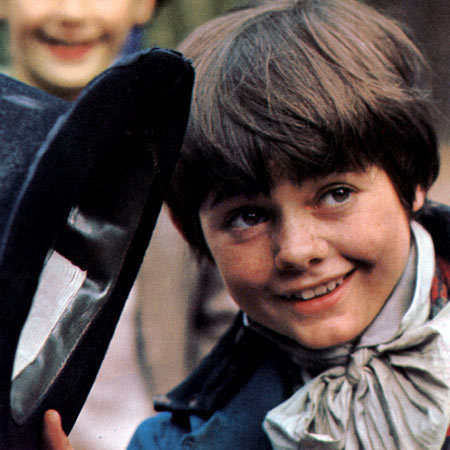

But Sam Sniperly (remember him?) also finds out, and there is a race to the country estate to find the people that now own the furniture containing that important legal document.

Thanks to the Artful Dodger’s connections, Oliver discovers who bought the furniture that holds the will that proclaims his rightful fortune. There is also Hero, a pitbull that is afraid of everything. The Artful Dodger has surrounded himself with a new posse consisting of an acrobatic boy named Flip, a teary-eyed lad named Happy Harry (he cries at everything, whether it is good news or bad), a tiny girl named Lilibet and a personality-free boy known as The Deacon. But as luck would have it, he is reunited with the Artful Dodger, who has abandoned his life of crime in favor of two new pursuits: the sale of discarded bits of iron from a pushcart and the liberation of miserable orphans from Mr. Bumble, his one-time foe at the orphanage/workhouse. And being underage, he is liable to be apprehended by Mr. Penniless and homeless, Oliver seeks work in London, but is not successful.

Puddy from the home and sells off the residence’s furniture. Brownlow’s nefarious nephew, who evicts Olvier and Mrs. Into this picture arrives Sam Sniperly, Mr. Alas, he dies without revealing the exact location of the will. Brownlow announces that he has hidden his will somewhere in his drawing room’s furniture. But for reasons that make absolutely no sense, Mr. Puddy that Oliver is to be the heir to his fortune. Brownlow is on his deathbed, and he confides to Oliver and to the housekeeper Mrs. Brownlow – but rather than depict him as Oliver’s great-uncle, as intended by Dickens, this film merely has him as the boy’s guardian. The film picks up some time Oliver is reunited with Mr. Indeed, this work is one of the most bipolar animated films ever made, swinging wildly between Dickensian intensity and dismal slapstick. The resulting “Oliver and the Artful Dodger” was, arguably, the most ambitious of the productions in “The ABC Saturday Superstar Movie” line-up, which included such inane distractions as “The Banana Splits in Hocus Pocus Park,” “Daffy Duck and Porky Pig Meet the Groovie Goolies,” “Popeye Meets the Man Who Hated Laughter” and the Marlo Thomas-fueled “That Girl in Wonderland.” (All of those titles have already been profiled in The Bootleg Files column.) But because it aimed so high, “Oliver and the Artful Dodger” turned out to be the most disappointing of the bunch due to its inability to settle on a singular personality. But rather than aim this endeavor at the big screen, Hanna-Barbera opted to deposit this offering in an ambitious anthology program called “The ABC Saturday Superstar Movie.” This program functioned as a movie-of-the-week presentation for kids, with original films produced by the era’s major television animation studios. Hanna-Barbera, the animation studio that all but owned kiddie television in the early 1970s, decided to resurrect Oliver and his troublemaker pal the Artful Dodger for another round of fun. However, an unlikely source believsed that Oliver Twist needed to be brought back for new adventures. One could have easily imagined that the success of “Oliver!” would have generated a sequel – after all, what better way to cash in on an Oscar-winning box office hit than by a quickie follow-up? But, of course, there was a problem here – Charles Dickens, whose book “Oliver Twist” inspired the film, was satisfied to conclude the story without giving its young hero further adventures – who in their right mind would want to improve on Dickens? And Lionel Bart, who wrote the West End musical production “Oliver!” (and who, incredibly, sold the rights to the work for a measly £350 during a period of financial hardship), had no interest in creating a sequel. The film’s commercial success also gave a major boost to the musical genre, which had been stumbling for a few years under the weight of top-heavy productions that failed to score with audiences. In early 1969, the British musical “Oliver!” was the big winner at the 41st Academy Awards ceremony, winning six Oscars including Best Picture.


 0 kommentar(er)
0 kommentar(er)
